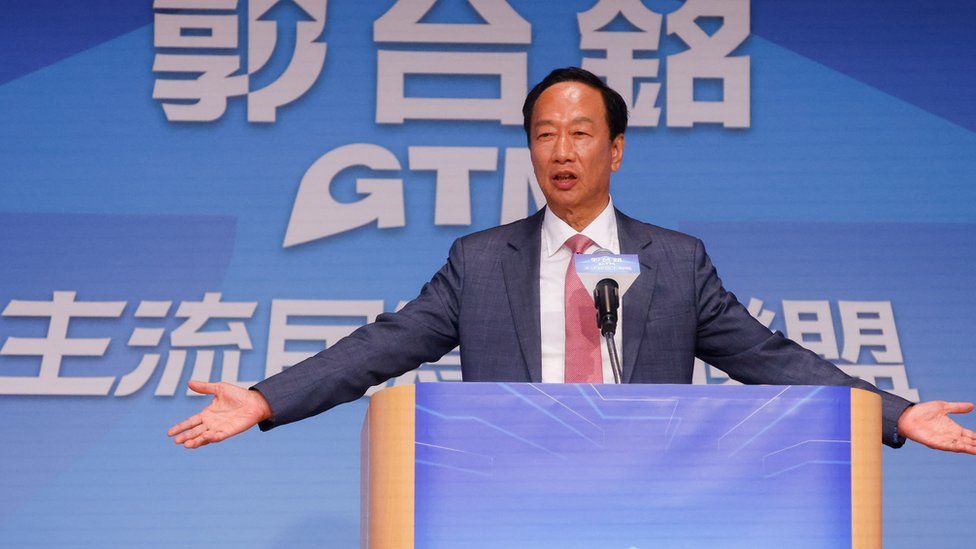Taiwan’s opposition vote will be split three ways in the January 2024 presidential election. Can the frontrunner be beaten?
The “law of holes” is reputed to have been coined by British Labour politician Denis Healey. It states that if you are in a hole and it’s difficult to get out, the first thing to do is stop digging.
This law could be applied to Taiwan’s political opposition. In a winner-takes-all presidential system, when there are already two opposition candidates vying to unseat the incumbent party, adding a third probably isn’t going to make the task easier.
And yet that is exactly what happened on Monday.
The latest to join the race for Taiwan’s presidency is Terry Gou, 72-year-old billionaire, and founder of the world’s largest electronics manufacturing company. Hon Hai Industries is better known around the world as Foxconn.
Mr Gou is a charismatic businessman with a great rags-to-riches story, pots of cash, and serious name recognition. Observers here in Taipei say if he was the only candidate standing against the ruling Democratic Progressive Party (DPP), Mr Gou would have a pretty good shot. But he isn’t.
Like another charismatic businessman across the Pacific, Mr Gou first attempted to get himself made the candidate of Taiwan’s main right-of-centre party, the old nationalist KMT (Kuomintang). Unlike in the United States, he failed.
The KMT chose another candidate, and Mr Gou quit the party in disgust. But the KMT isn’t Mr Gou’s only problem.

Taiwan has another opposition party, called the Taiwan People’s Party (TPP), and it is led by another charismatic populist called Ko Wen-je. Mr Ko is the former mayor of Taipei city and is currently running second in polls. He is doing particularly well among younger Taiwanese voters.
Terry Gou’s main selling points are not just his wealth and business success. It is his experience working in and with China.
Foxconn became the world’s biggest electronics manufacturer by pioneering the model of combining Taiwanese engineering knowhow with skilled Chinese labour. In the 1980s and 90s Terry Gou built huge manufacturing campuses in southern China and recruited tens of thousands of young Chinese to work in them.
The model was so successful he eventually persuaded Apple to outsource much of the manufacturing of MacBooks and iPhones to Foxconn. It made Foxconn Taiwan’s biggest company and Mr Gou one of its richest entrepreneurs.
Now Mr Gou says he can use that same experience of investing and working in China to protect Taiwan’s security. Terry Gou says he wants to prevent Taiwan from “becoming another Ukraine”. Announcing his candidacy, he said he would lead Taiwan “back from the abyss of war with China”.
He is not the only one who sees the threat from China as increasingly perilous. In the last year Beijing has hugely increased its military operations around the island.

China and Taiwan: The basics
- Why do China and Taiwan have poor relations? China sees the self-ruled island as a part of its territory and insists it should be unified with the mainland, by force if necessary
- How is Taiwan governed? The island has its own constitution, democratically elected leaders, and about 300,000 active troops in its armed forces
- Who recognises Taiwan? Only a few countries recognise Taiwan. Most recognise the Chinese government in Beijing instead. The US has no official ties with Taiwan but does have a law which requires it to provide the island with the means to defend itself
China and Taiwan: A really simple guide

Last week the People’s Liberation Army released a highly produced propaganda video showing Chinese troops practising for what looked very much like an invasion of Taiwan’s beaches.
Last week the People’s Liberation Army released a highly produced propaganda video showing Chinese troops practising for what looked very much like an invasion of Taiwan’s beaches.
The difference is who Mr Gou blames – not Beijing, but Taiwan’s own President Tsai Ying-wen.
He says it is the ruling DPP’s hostility to Beijing that has led the island to the edge of this “abyss”. Mr Gou says he would return Taiwan to a previous status quo negotiated between Beijing and Taipei back in 1992 and further, he says, he would seal an agreement that would bring peace to the island for the next 50 years.
There are many here who are deeply sceptical of whether such an agreement is attainable.
But that is not Mr Gou’s biggest challenge. Instead, that is the electoral maths. What Mr Gou is proposing is just not that popular with Taiwan’s electorate.
Opinion polls here show most Taiwanese do not believe it is their government that is to blame for the growing tensions with Beijing. They are not in favour of making concessions to Beijing on sovereignty in order to secure peace. A large majority of Taiwan voters now identify themselves as Taiwanese, not Chinese, and say they would be prepared to fight to defend the sovereignty of their home.
Opinion polls also show that around 40% of voters are pretty solid supporters of the ruling DPP. That means the ruling party can be beaten. But to have any chance the opposition would have to unite around a single candidate.
Mr Gou clearly thinks that should be him. He says the three opposition candidates are like “the three little pigs” who must unite to defeat the “big bad wolf” of the ruling DPP. But there is no sign of that happening. Instead, despite his wealth and fame, Mr Gou’s candidacy looks more likely to divide the opposition vote further.
And that means even with 40% of the vote, William Lai, from the ruling DPP, is still the most likely candidate to become Taiwan’s next president.

This video can not be played
To play this video you need to enable JavaScript in your browser.
Related Topics
- Asia
- Taiwan
